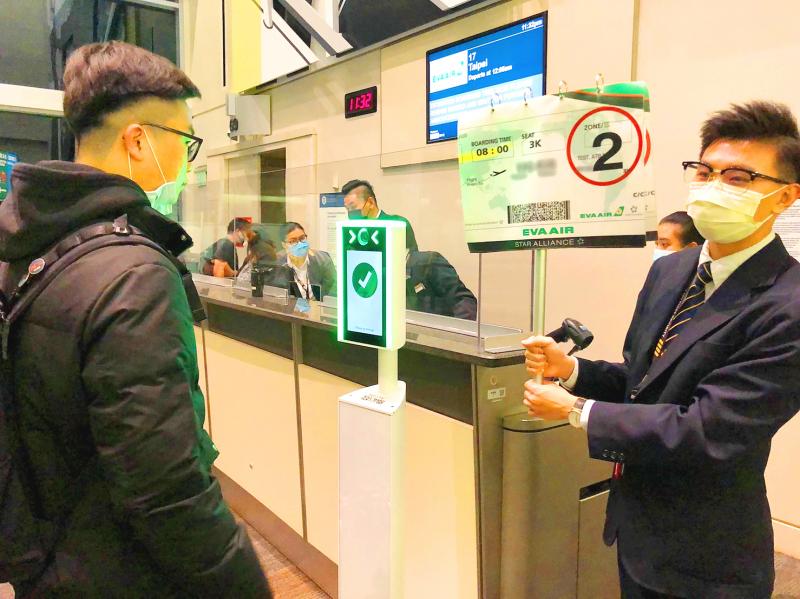Taiwan’s two major airlines yesterday said that they are better able to address the COVID-19 risk in airports with a facial recognition system that enables touchless boarding.
EVA Airways Corp (長榮航空) said that it began offering the service yesterday on flights from San Francisco to Taiwan as part of the US Biometric Exit Program, which collects biometric information from travelers.
The program gives passengers the option of having their facial images taken at boarding gates, which must match their boarding pass information and biometric profile stored by US Customs and Border Protection.

Photo courtesy of EVA Airways Corp
Program participants no longer need to scan their boarding passes at gates, speeding up the boarding process and reducing the risk of physical contact, EVA said.
However, infants and passengers who need special assistance would still need to board in the traditional manner, it said.
EVA said that it plans to expand the service to seating, checked-in luggage, security checks and the use of VIP lounges, making air travel safer and more convenient during the COVID-19 pandemic.
China Airlines Ltd (CAL, 中華航空) said that it began using the facial recognition system on flights from New York in July and on flights from San Francisco in September.
However, the system is still coupled with manual checks by airline staff, CAL said, adding that it would be upgraded further and introduced in airports such as Los Angeles and Hong Kong.

Taiwanese suppliers to Taiwan Semiconductor Manufacturing Co. (TSMC, 台積電) are expected to follow the contract chipmaker’s step to invest in the US, but their relocation may be seven to eight years away, Minister of Economic Affairs J.W. Kuo (郭智輝) said yesterday. When asked by opposition Chinese Nationalist Party (KMT) Legislator Niu Hsu-ting (牛煦庭) in the legislature about growing concerns that TSMC’s huge investments in the US will prompt its suppliers to follow suit, Kuo said based on the chipmaker’s current limited production volume, it is unlikely to lead its supply chain to go there for now. “Unless TSMC completes its planned six

Intel Corp has named Tasha Chuang (莊蓓瑜) to lead Intel Taiwan in a bid to reinforce relations between the company and its Taiwanese partners. The appointment of Chuang as general manager for Intel Taiwan takes effect on Thursday, the firm said in a statement yesterday. Chuang is to lead her team in Taiwan to pursue product development and sales growth in an effort to reinforce the company’s ties with its partners and clients, Intel said. Chuang was previously in charge of managing Intel’s ties with leading Taiwanese PC brand Asustek Computer Inc (華碩), which included helping Asustek strengthen its global businesses, the company

Power supply and electronic components maker Delta Electronics Inc (台達電) yesterday said second-quarter revenue is expected to surpass the first quarter, which rose 30 percent year-on-year to NT$118.92 billion (US$3.71 billion). Revenue this quarter is likely to grow, as US clients have front-loaded orders ahead of US President Donald Trump’s planned tariffs on Taiwanese goods, Delta chairman Ping Cheng (鄭平) said at an earnings conference in Taipei, referring to the 90-day pause in tariff implementation Trump announced on April 9. While situations in the third and fourth quarters remain unclear, “We will not halt our long-term deployments and do not plan to

The New Taiwan dollar and Taiwanese stocks surged on signs that trade tensions between the world’s top two economies might start easing and as US tech earnings boosted the outlook of the nation’s semiconductor exports. The NT dollar strengthened as much as 3.8 percent versus the US dollar to 30.815, the biggest intraday gain since January 2011, closing at NT$31.064. The benchmark TAIEX jumped 2.73 percent to outperform the region’s equity gauges. Outlook for global trade improved after China said it is assessing possible trade talks with the US, providing a boost for the nation’s currency and shares. As the NT dollar